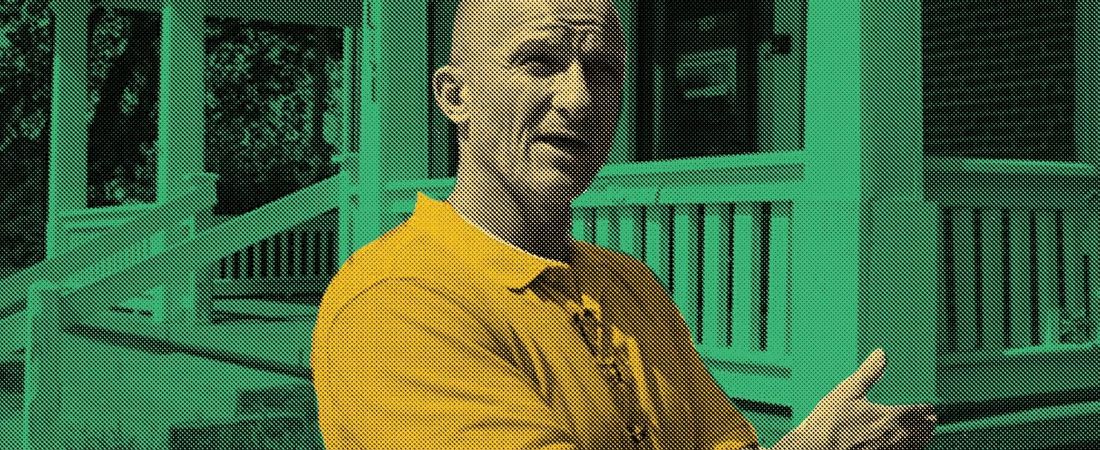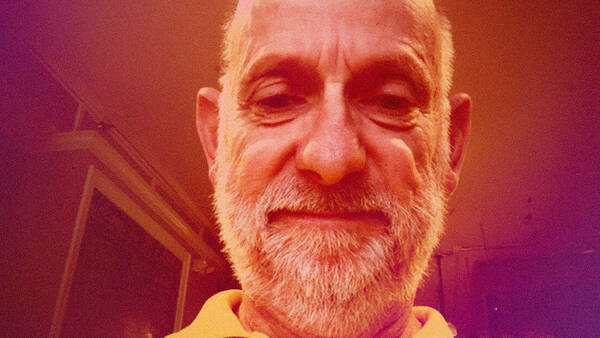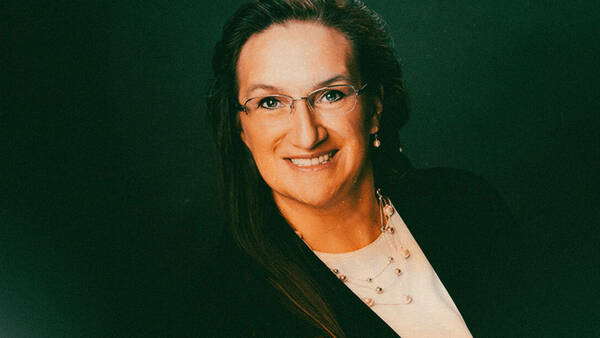Five years ago, Joe Radzikowski ’96 faced a turning point. Years of intermittent alcohol and drug abuse had caught up with him, and he faced criminal charges and an ultimatum from his wife, who told him he needed to turn things around.
That’s when Radzikowski sought help from Trinity Life Ministry, a faith-based nonprofit in Lafayette, Ind. that provides an intensive residential recovery program for men struggling with addiction. The decision to enter a months-long program was difficult, since it required time away from his wife, Melanie, and daughter, Emma, but it paid off.
The program enabled him to build a new life of recovery and faith, a life he now uses to help others as Trinity’s development and communications director, where he helps find crucial funding and resources while directing public relations and marketing efforts for the nonprofit. Last year, Trinity helped more than 60 clients and added a family program to support their loved ones, and the organization plans to expand services to a neighboring county in 2019.
“That experience has propelled me into a new track in my life and a new purpose: serving Christ,” Radzikowski says. “I believe that in God’s economy, nothing is wasted. My past struggles are an asset.”
Finding Hope
The struggles that brought Radzikowski, a South Bend native, to his current vocation with Trinity began in his youth.
His father committed suicide when he was just 18 months old, leaving his mother with three children under the age of five. It was a difficult start. In high school, he began drinking and using marijuana. He drifted aimlessly for a few years afterward, at one point moving to California. At 22, he decided to move back, thinking he might pursue college.
Nearly a year later, after transferring buses at an Indianapolis Greyhound station on a return trip to South Bend, he sat next to a nun. As Radzikowski shared his past struggles and expressed his still-vague plans to pursue education, the nun asked, “Growing up in South Bend, didn’t you want to attend Notre Dame?”
Nothing was further from his mind at that point, as Radzikowski had long ago forgotten this childhood dream, but the conversation planted a seed. He prayed, went to work, and gained admission to Holy Cross College, where he spent a year. Just 13 months after that bus ride, he was accepted at Notre Dame. At Christmas in 1993, he presented his mother with the presents he’d never imagined: an “ND mom” coffee mug and sweatshirt, and his acceptance letter.
A Turning Point
After graduating with a double major in finance and sociology, Radzikowski worked a succession of jobs. He had a short stint as a stockbroker, started a mortgage services company, and consulted. But despite his outward success, he says, he felt something was missing, and every so often, he’d turn to alcohol and drugs to help fill a spiritual void.
One evening in October 2013, Radzikowski was driving under the influence of drugs when he came upon the scene of an accident cleanup. He panicked, and in trying to get away as quickly as possible, he accelerated and almost hit a police officer, then led police on a chase. The officers who arrested him didn’t realize he was driving impaired, but he still faced charges: aggravated battery, resisting law enforcement, and criminal recklessness.
Radzikowski pled to lesser charges, and with his wife’s help, found Trinity. He entered a five-month program where, he says, he found freedom from addiction and shame and developed a measure of humility. The program also helped him discover a meaning in his faith—one that had eluded him thus far.
“I was always looking for the next big thing to make me happy,” Radzikowski says. “The staff and volunteers at Trinity helped me to cultivate my faith and a new identity in Christ, but also to begin to trust this God who I’d believed in for so long.”
Giving Back
Radzikowski was grateful for the help Trinity offered him, and after his program ended, he worked as a volunteer for the organization. In 2016, he accepted his current position as Trinity’s development and communications director. His wife joined the staff in the fall of 2017 to develop and implement Trinity’s family program.
The organization works with clients from a variety of backgrounds. Some are working professionals, while others have just finished a prison sentence. But whatever their drug of choice— often opioids, cocaine, methamphetamine, or alcohol—clients are often trying to escape their emotions and a life that lacks meaning.
“We employ a biblical model of addictions treatment,” Radzikowski says. “Getting someone to stop using drugs or alcohol can be challenging. But that can be easy compared to helping them find freedom from the root causes or heart issues and addressing the other areas of their life—areas that are going to be necessary to remain drug and alcohol free.”
Trinity now offers a one-year residential program that includes daily chapel, classroom instruction, biblical counseling, mentoring, service projects, and job training. The goal, Radzikowski says, is to help clients find freedom, embrace a new identity in Christ, and honor God in all areas of their lives.
“Once they’re free from drugs and alcohol, the other issues are often that they’re riddled with anxiety, bitterness, shame, regret, and fear,” Radzikowski says. “So we utilize scripture and a biblical approach to address the shame and the guilt through the blood of Jesus, but we also help them cultivate a trusting relationship with God and other people to help them reduce anxiety. There are so many things they need to deal with. Part of it’s spiritual, a lot of it’s emotional, and then of course there’s the collateral damage—relationship issues, medical problems, and legal issues.”
Thanks to Trinity’s holistic recovery approach, Radzikowski says, he can look forward to seeing clients succeed. After completing the residential program, they have gone on to repair relationships and build families and careers. A number continue to volunteer as mentors or come to work for Trinity: four of its five life coaches are program graduates.
Radzikowski draws deep meaning from his work—a meaning that has become more poignant in recent months. In November 2017, his mother passed away from cancer, and in early January, he was diagnosed with stage IV colon cancer. But as he and his wife battle his difficult health prognosis, they draw strength from their work.
“We believe in what we’re doing and we lay down our lives for what we believe in,” Radzikowski says. “We are committed to serving and giving of ourselves. If we didn’t have this purpose and passion in our hearts, if we didn’t have these wonderful, committed people who care not only about our mission but who care about us, I couldn’t tell you where we would be emotionally right now. I can tell you most days we have joyful hearts and give thanks.”
To learn more about the work Trinity Life Ministry does to help men struggling with addiction, please visit its website.



